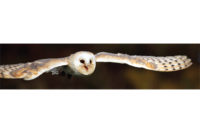The Israel Nature & Parks Authority (INPA) is using PowerG™technology from Visonic Ltd., Tel-Aviv, Israel, a developer and manufacturer of wireless home security and safety systems and components, to enable research that will help protect the griffon vulture population in Israel.
Sadly, the population of the griffon vulture in Israel has been rapidly declining. Only a couple of hundred birds remain in the wild. This dramatic decline has been caused mainly by the massive and uncontrolled use of pesticides that result in poisonings, and well as through ill-treatment and accidental electrocution. Moreover, many important aspects of the vultures’ demography and feeding habits are not fully understood. This knowledge is crucial to implementing proper management measures. As a result, the INPA initiated a research program to monitor and observe the vultures' behavior and activities. The hope was that the collected research data on the vultures' feeding and mating habits would provide clues to ensure the vultures' survival and shed light on the mystifying population decline.
To monitor the vultures' behavior, the INPA constructed more than 20 feeding stations across Israel. These feeding stations provide the vultures with sufficient food — free of poisons and chemicals. At each feeding station, the INPA rangers place in close proximity a "logger"—a special device containing a wireless Visonic transceiver that communicates using the company's PowerG RF technology. Also, a tag containing a Visonic PowerG transceiver is attached to a wing of each vulture. The tag communicates with the feeding station's logger. To enable reliable monitoring, Visonic developed a special application over the PowerG technology: when a vulture is far from the feeding station, the tag sends a signal to the logger approximately every four minutes. The logger normally will not receive the signal due to the distance. However, when the vulture reaches the proximity of the feeding station (several hundred meters), the logger will begin to receive the signal. From that moment on, as long as the vulture is in communication distance from the logger, the tag sends signals every few seconds. The logger then records various data such as which vulture is at the feeding station and its signal strength. This provides critical information about the vultures' eating habits and group behavior.
Visonic's PowerG technology helps meet the INPA's needs for this important research project several ways: the two-way synchronized transmission enables communication between the tag and logger and an adaptive signal rate based on distance; the RF range is broad, ensuring a communication distance of several hundred meters; the battery lifetime of the tags is sufficient (more than three years); and the equipment is rugged enough for outdoor conditions, while lightweight enough to be attached to the vultures' wings.
"We are excited about the new possibilities Visonic's PowerG-based devices are opening for us," commented Ohad Hatzofe, avian ecologist at the science and conservation division of the INPA. "This technology empowers us to collect crucial data for understanding the behavior and habits of the vultures and will subsequently enable us to protect them and increase their population."
The Israel Nature and Parks Authority (INPA) is a governmental body responsible for the protection of nature, landscape and heritage in Israel. INPA has three main goals:protection of biodiversity, ecosystems and landscapes in national parks, nature reserves and open spaces; protection of heritage sites in national parks and nature reserves and fostering them for the benefit of visitors; education to instill the values of protection of nature, landscape and heritage sites and to increase public awareness of these issues.
For information, visit www.parks.org.il or www.visonic.com.



